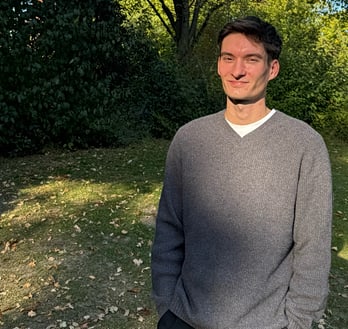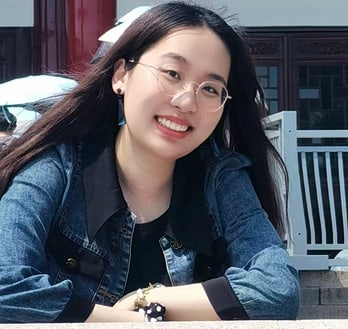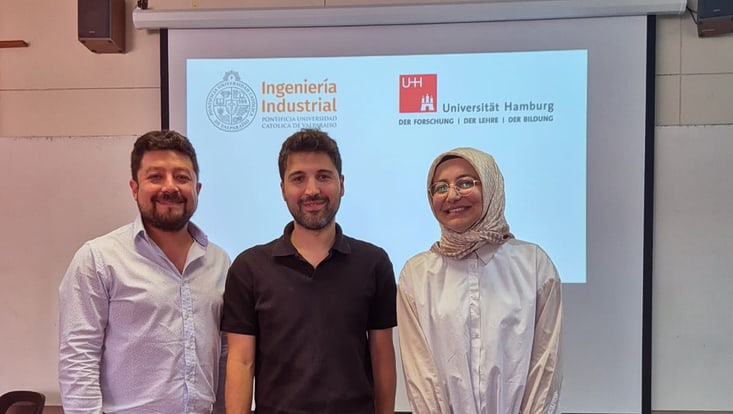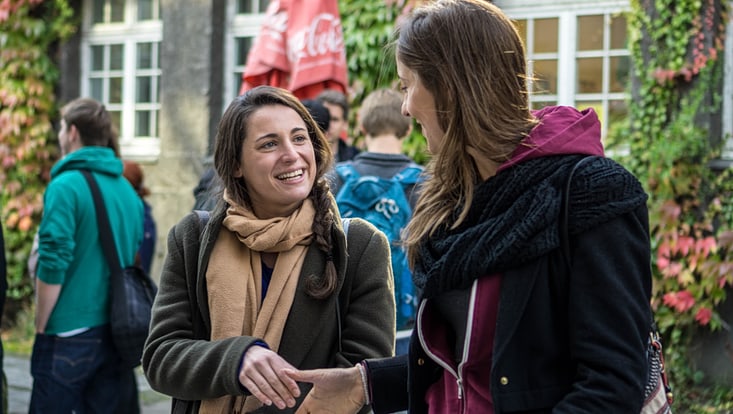International Online Sustainability Week (IOSW)Summer school on sustainability for students from around the world
30 September 2025, by Denise Longe

Photo: UHH/Neumann
The first IOSW took place at the Business School from September 22 to 26. Interactive discussions and presentations offered participants the opportunity to deepen their knowledge and gain insights from different perspectives.
To promote exchange and engagement with the topic of sustainability at an international level, Prof. Dr. Simone Neumann, professor of business administration specializing in sustainable logistics and mobility systems and sustainability officer, launched the first International Online Sustainability Week (IOSW). Together with Prof. Dr. Christian Thies, Resilient and Sustainable Operations and Supply Chain Management at the Technical University of Hamburg (TUHH), she accompanied the participants virtually and in English from September 22 to 26. Students from the Business School, Brazil, China, and Ghana took part.
The aim of the IOSW is not only to teach students about sustainability in theory, but also to give them practical experience. In addition to expert lectures, part of the event consisted of a simulation of a UN summit to define measures against climate change, as well as group work on the “The Week” project, which deals with concrete proposals for individual contributions to climate protection.
“It was important to us to strike a good balance between discussion, group work, and lectures,” says Prof. Dr. Neumann. “We were delighted to welcome high-caliber experts from various fields to Sustainability Week.” Three lectures illustrated the “three pillars of sustainability,” covering the dimensions of ecology, economy, and social issues. The keynote speakers were Prof. Dr. Thomas Metzinger, Professor Emeritus at Johannes Gutenberg University in Mainz, Prof. Dr. Dirk Notz, University of Hamburg, Head of Sea Ice and Deputy Managing Director of the Institute of Oceanography, and Prof. Dr. rer. nat. Stephan Krinke, Head of Sustainability Management and Life Cycle Engineering at Fraunhofer IST and Professor for Sustainability Management at the Technical University of Braunschweig.
In addition to the content, the interactive exchange was also well received by the participants: “The IOSW was not only an opportunity to learn more about sustainability, but also to experience different perspectives, considering that people come from different fields of expertise,” says Hebert, a master's student of law from Brazil.
You can read more comments from participants in the interview with Niklas Göttel, a master's student in business administration at the Business School, and Yanan Zhao, a master's student at East China Normal University and prospective exchange student at the University of Hamburg.
An IOSW is also planned for 2026. Registration information will be published on the website in spring.
On the topic of sustainability, please also read the Research & Understanding article on supply chains and AI.
Comments from IOSW participants

privat
Niklas Göttel is a student in the Master of Science in Business Administration program at the University of Hamburg Business School. Read his feedback on the IOSW here.
What made you decide to participate in the IOSW?
The IOSW sounded interesting to me because, although I had come across the term “sustainable” repeatedly during my student career, I had unfortunately not really delved deeply into the topic. That's a shame, but I was all the more pleased when I heard about the event during the summer semester. To be honest, I have to say that although I had some idea of what the term meant, it had always remained a rather vague collective term for me. So I had high hopes that I would now learn more about it, and I felt that it would be a useful addition to my studies so far.
What exactly is the IOSW and what were your key learnings?
The IOSW can be thought of as a study group of students from all over the world. You work in teams, conduct research, and listen to guest lectures by professors and researchers. Step by step, you approach the topic. It is important not to underestimate what it means to understand why we actually need to spend a whole week talking about this. In short, it is about the fact that difficult times lie ahead. Apart from climate change, in perhaps 30 years, or maybe even in 10 years, each of us will feel the consequences of our decades of ruthless treatment of nature. Unfortunately, this is the truth, and it can be very frustrating to suddenly be confronted with a concentrated load of scientifically proven facts, none of which promise a particularly rosy future. But the IOSW is not there to bluntly convey hard and unwelcome facts; it gives us the opportunity to understand the issue in such a way that we can turn knowledge into action. It shows us ways in which we can still turn things around. And it gives us advice on how we can make a big difference with little effort, both in our own daily lives and in a professional context.
Why would you recommend other students to participate in the next IOSW?
The IOSW is a fantastic event that gives participants a comprehensive insight into what sustainability and sustainable action actually mean. Students are introduced to the topic in a very clearly structured way and work together in international teams. They can put themselves in the shoes of entrepreneurs, politicians, diplomats, and representatives of all sectors of the economy and get an impression of how complex, but also how urgent, the whole topic is. In my opinion, everyone should engage with the topics covered in the IOSW as part of their academic education.

privat
Yanan Zhao completes her Master of Arts in English Language and Literature at East China Normal University and will join the University of Hamburg’s winter semester international exchange program in October 2025. Read about her impressions of the IOSW here.
What motivated you to participate in the IOSW?
I joined the IOSW because I am personally interested in topics of sustainability and environmental protection, which are also strongly promoted in China at the moment. In addition, I wanted to learn more about international study opportunities and to get a first-hand impression of the academic and cultural environment at the University of Hamburg.
What was your most important learning experience from the IOSW?
What impressed me most was working in groups with my fellow participants. For example, the Climate Action Simulation Game, where we represented different perspectives and stakeholders, and our final plenary discussion, where we tried to design our own project. These activities deepened my understanding of the complexity of sustainability challenges and the importance of cooperation across sectors. Also, because this is such an international and interdisciplinary platform, I was very glad to hear global voices and build new connections. At first, I was worried that my English would not be good enough, but in fact we were able to have very good discussions and work together effectively. I am truly grateful for the support, understanding and help from all the teachers and fellow participants.
Who would you recommend to participate in the next IOSW?
For students interested in environmental and sustainability issues, I strongly recommend the IOSW as a unique chance to engage with these topics in a practical way. For international students who are about to start their studies at the University of Hamburg, I also recommend it as an excellent opportunity to get oriented, make friends and feel at home before the semester begins.


